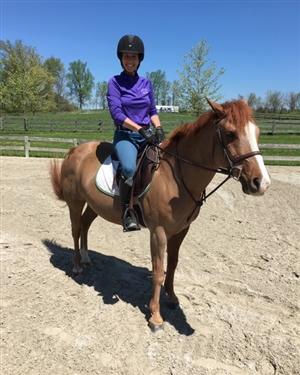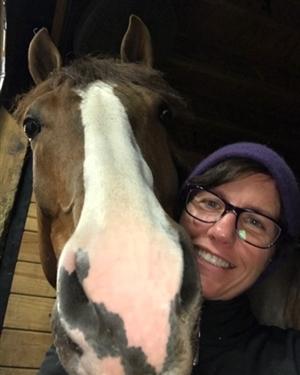Thanks to rehab after horse riding accident, happy to be back in the saddle
Megan Reese Van Sinderen had been riding horses and competing in shows her entire life. She had just moved up a level in competition and was riding in a show at the Wellington Equestrian Center in Palm Beach County, Florida, where top-level riders from around the world go to compete. “It’s the crème de la crème,” says Megan, citing onlookers like Michael Bloomberg and Bruce Springsteen, “where the jumps are huge, and so is the competition.”

Horse riding head injury followed by secondary head injury
After the fall, she got up, brushed herself off, and did what any rider does: She got back on the horse. That was a Friday. And aside from a light headache and feeling a bit fuzzy, she went on to ride all weekend, placing fifth in the Wellington High Adults Jumper Classic. Megan then flew back to Philadelphia, worked all week then flew back to Florida to compete again.
As she was packing up, she reached down into her tack trunk, a massive wooden trunk that riders put all their gear in to travel from show to show. While she was bent down and reaching into the trunk, the 35-pound trunk lid—held only by rope—fell and whacked her on the back of the head. It was one week and one day after her horse riding accident.
Still, Megan went about her day, enjoying time with friends. “I thought nothing of this,” she recalls, “it just hurt.” The next morning she awoke feeling nauseated. “I still had no idea what was going on.”
On horseback that day, she started to sense something was off as she rode up to a fence and crashed into it, then came around again and crashed into it again. “I just couldn’t see a distance,” she adds.
Signs of head concussion lead her to Bryn Mawr Rehab
On the plane home, Megan had a terrible headache. When the stewardess asked if she wanted something to drink, Megan tried to say seltzer water but all she could get out was “white water.” The following weekend, Megan was scheduled to lead a course, but by this time she couldn’t look at a computer and she was still feeling nauseated. It was then she finally realized she needed to seek help.
At her local hospital, it didn’t take long for her to be diagnosed with a concussion. From that point, a friend who’d had several concussions within a few years, recommended Bryn Mawr Rehab Hospital, part of Main Line Health. “Do not mess around,” the friend had advised.
At Bryn Mawr Rehab, Megan was seen by Brian P. McDonald, DO, who found she was scoring high on each item on the Post Concussion Symptom Scale (PCSS). She was then admitted to the Concussion Center at Bryn Mawr Rehab on an outpatient basis.
Treatments for concussion
Megan began her healing journey through postconcussion therapy, which included a combination of therapies geared to her own life goals. She would receive physical therapy for vestibular (balance issues) and cervical treatment to address dizziness, balance deficits, and neck pain. She also received occupational therapy to address visual dysfunction, and speech therapy to address cognitive deficits.
“The main goal of Megan's therapy was for her to return to her previous level of activity, which included her role as homemaker, returning to work, and returning to equestrian activities,” explains physical therapist Deborah Watson-Shaeffer.
Megan recalls vestibular therapy for vertigo, a balance disorder, being particularly helpful. “They have this amazing machine with goggles and they watch your eyes to see whether or not they move or jiggle,” she recalls, referring to the video Frenzel goggles. She also describes Sensory Organization Test (SOT) in which she was in a harness while the floor and walls move and she was supposed to keep still in the harness. “The dizziness went away very quickly after that,” she adds.
Through speech therapy, Megan was able to improve her memory skills. “We did this computer thing where you go out to buy groceries while somebody is giving a weather forecast in the background and somebody’s talking in the foreground. Then they give you test.”

“As with any patient with a concussion, we educate them on symptom management and appropriate level of activity, starting early in the recovery period,” says Watson-Shaeffer, explaining that as Megan progressed in therapy, her activity level increased. In vestibular therapy, simulated equestrian activities were introduced to mimic the movement of the horse as well as the circular and figure eight patterns similar to those that would be performed in the ring. “Once she was symptom-free with these activities, she was cleared to return to riding with restrictions.”
To get her comfortable astride a horse, they started her off on a tiny pony. Megan then followed a graduated program which included progression from walk to trot to canter as well as time spent on the horse.
“I thought it was fantastic they try to mimic what it is you want to do,” she says.
Equestrian therapy is one of Bryn Mawr Rehab's many physical and occupational therapy services and is usually prescribed to complement a person's treatment program. Equestrian therapy sessions are conducted by a licensed physical therapist or occupational therapist with competency training in equestrian therapy and a therapeutic riding instructor, and the sessions are held weekly at Thorncroft Equestrian Center, located one mile from Bryn Mawr Rehab Hospital. Therapeutic riding programs are planned according to each individual's needs and abilities.
Other goals included attending the annual Pink Horseshoe Ball that she really didn’t want to miss. Again, the therapists gave her strategies for being with people at a busy event. “’Notice how you feel,’ they told me, and don’t drink anything that will alter that.”
Traumatic brain injury support group helps with anxiety attacks
Soon after her horseback riding accident, Megan found that she couldn’t be in a room full of people and that leading courses as she had done in the past was out of the question. Megan describes being unable to operate the way she had before and sometimes being unable to even communicate that. “I really wasn’t present when people talked to me,” she continues. “People later said I was not the person they knew before the fall. For months, that’s how it was. And I slept a lot.”
She also experienced anxiety attacks that would “just come over me,” she says. “They told me when you have a brain injury, it’s a physiological response. I’d be sitting there and nothing had happened but I’d suddenly feel like I was going to die.” She found herself crying a lot, another side effect of concussion, and benefited greatly from the brain injury support group at Bryn Mawr Rehab. “It was important to be with other people who were going through it,” she adds. “I didn’t have a scar on the outside of my face, I looked fine and like I should be acting appropriately.” But inside, she was simply not who she knew herself to be and she found it very frustrating. “It was very helpful to hear others share that at the support groups.”
Riding after concussion and a new future

Recovering from concussion has affected many areas of her life. She became a vegan in the process, and she continues to do physical therapy several times a week. Megan is also working with a sports psychologist on her training and performance. She is now creating her own personal coaching business, helping people do what they love to do. Ultimately, she says, “I’m seeing the blessing inside of all of this. Everything’s shifted to where the universe wanted me to be.”
Main Line Health serves patients at hospitals and health centers throughout the western suburbs of Philadelphia. To schedule an appointment with a specialist at Main Line Health, call 1.866.CALL.MLH (225.5654) or use our secure online appointment request form.
 Content you want, delivered to your inbox
Content you want, delivered to your inbox
Want to get the latest health and wellness articles delivered right to your inbox?
Subscribe to the Well Ahead Newsletter.
